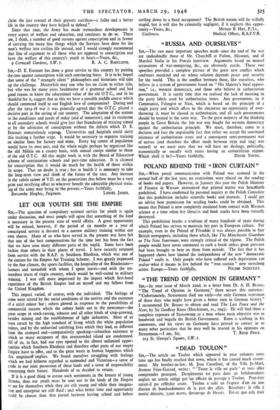SIR,—D. E. Estcourt has done a great service to this
country by putting the case against conscription with such convincing force. It is to be hoped that some of the " strangely silent " philosophers and historians will take up the challenge. Meanwhile may one who has no claim to either title, but who was for many years headmaster of a grammar school and had good reason to know the educational value of the old O.T.C., and to be thankful for it, suggest that in this we have a possible middle course which should commend itself to our English love of compromise? During and after the 1914-18 war it was generally agreed that the O.T.C. played a decisive part in the saving of our country. The adaptation of the system to the conditions and needs of today (and of tomorrow), and its extension to all secondary schools would give just that foundation of training aimed at by the advocates of conscription without the defects which D. E. Estcourt remorselessly expose. Universities and hospitals could carry this training a further stage. It would be necessary to organise training on similar lines for factory and mine. Every big centre of population would have its own unit, and the whole might perhaps be organised like the old Militia on a county basis, with annual camps similar to those of the old O.T.C. All this might work in with the Board of Education, scheme of continuation schools and part-time education. It is claimed for conscription that it would do much for the health of those within its scope. That no doubt is true ; but in health it is necessary to take the long-term view and think of the future of the race. Any increase in the subtle career of V.D. on the generations that follow must be a very grim and terrifying offset to whatever benefit the admirable physical train- ing of the army may bring in'the present.—Yours faithfully,


























 Previous page
Previous page